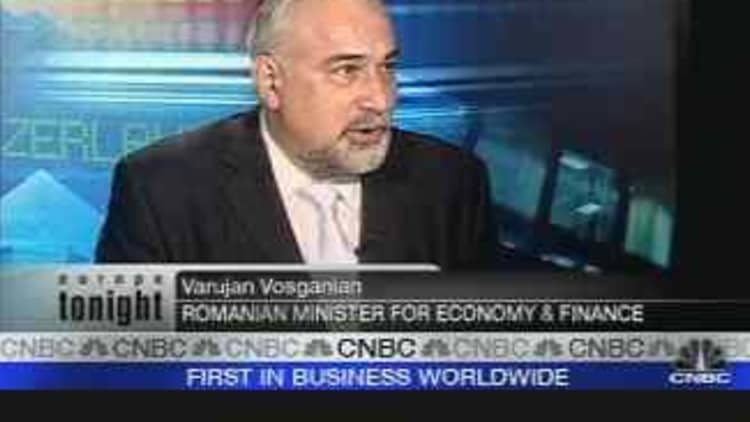The impact of the turmoil in the international financial markets on Romania is likely to be limited, as the country enjoys robust economic growth and private lending is still at low levels, Economy and Finance Minister Varujan Vosganian told CNBC.com on Thursday.
The stock exchange in the new EU member country fell by around 25 percent in the past six months, while its leu currency lost around 10 percent of its value, but both have recently started to recover.
“Such disturbances from the financial markets don’t have so many doors to enter the Romanian markets,” Vosganian told CNBC.com in an interview.
The Romanian economy is not dependant on the level of the dollar and there are no securitized mortgages on the Bucharest stock exchange, he added.
Romania’s gaping current account deficit, of around 14 percent of gross domestic product, spooked foreign investors who pulled out of the country’s capital markets as soon as the international mood had turned bearish.

At the beginning of February, ratings agency Fitch changed its outlook to negative for Romania, Bulgaria, Estonia and Latvia because of the huge external deficits, saying Latvia's was 25 percent of GDP, Bulgaria's was 19.5 percent, Estonia's 16 percent and Romania's 14 percent.
Too Harsh?
But Vosganian said that in Romania’s case the deficit was caused by the need to feed a growing economy, which is expanding at rates of around 6 percent annually and needs imports of energy and technology, and the agency’s decision was too harsh.
“I think it’s not fair to put a negative perspective on Romania,” he said. The country’s public debt is just 12 percent of GDP and the central bank’s foreign exchange reserves cover around 6 months of imports.
Responding to European Union concerns that the budget deficit risks overshooting the 3 percent of GDP limit allowed by the Maastricht criteria, Vosganian said his government was committed to keeping the public gap under control.
Last year’s deficit was around 2.6 percent of GDP and this year the aim is to reduce it to around 2.3 percent, despite the fact that parliamentary elections are scheduled for later this year, Vosganian said.
Trade unions have accepted that wage rises will not exceed inflation in 2008, he said.
“As long as I am minister, the budget deficit will not exceed 3 percent,” Vosganian added.
He said Romania still plans to go ahead with the issuance of between 500 million euros ($740 million) and 1 billion euros worth of Eurobonds on the international markets, but details of the issuance will be decided after the EU approves a strategy to reduce the budget deficit.
“We want to use the Eurobonds issue not only to get money… but to give a signal of confidence in the Romanian economy,” Vosganian said.

